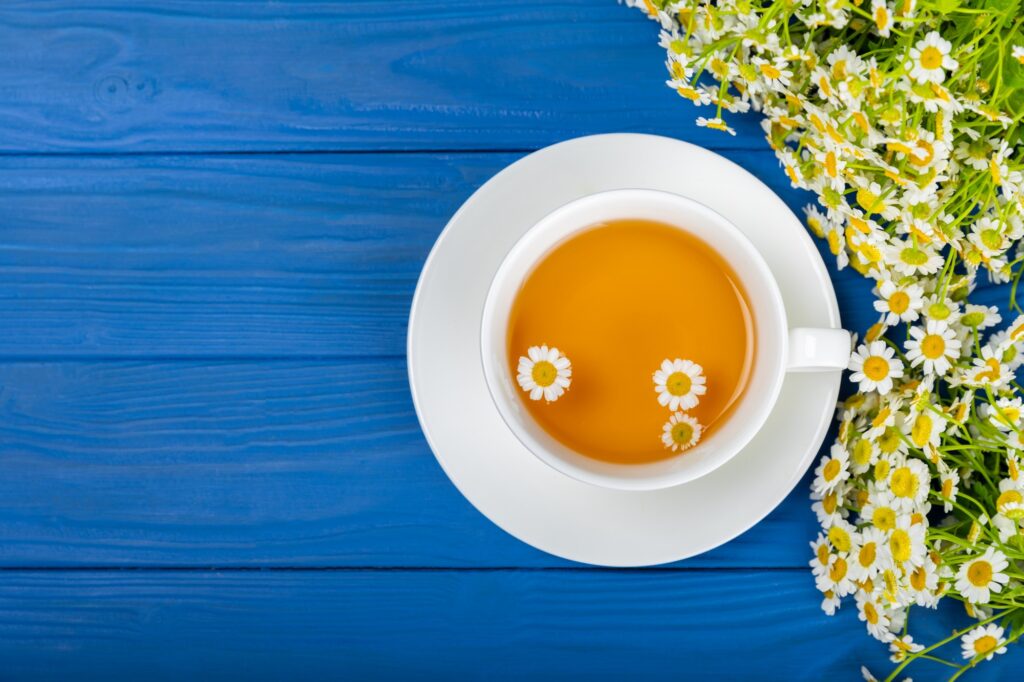
Pregnancy often brings a host of questions about what’s safe to consume, and chamomile tea is no exception. Many expectant mothers wonder, “Can you drink chamomile tea while pregnant?” This soothing beverage has long been praised for its calming properties, but its safety during pregnancy has been a topic of debate among healthcare professionals and expectant mothers alike.
Chamomile tea during pregnancy is a complex issue that requires careful consideration. While some tout its potential benefits for common pregnancy symptoms, others caution against its use due to safety concerns. This article aims to explore the science behind chamomile tea, its effects on pregnancy, and the precautions to keep in mind. By examining both the potential advantages and risks, we’ll help you make an informed decision about whether chamomile tea has a place in your prenatal routine.
The Science Behind Chamomile Tea
Active Compounds
Chamomile tea, derived from the flowers of Matricaria recutita (German chamomile) or Chamaemelum nobile (Roman chamomile), has a rich composition of over 120 chemical components 1. These include sesquiterpenes (such as bisabolol and farnesene), sesquiterpenelactones (like chamazulene and matricin), flavonoids (including apigenin and luteolin), and volatile oils 1. The presence of these compounds contributes to chamomile’s pharmacological activity and potential health benefits.
Mechanism of Action
The diverse array of active compounds in chamomile tea interacts with the body in various ways. Flavonoids and coumarins present in chamomile have shown affinity for estrogenic receptors, with some compounds theoretically having a higher affinity than estradiol 2. This interaction with hormonal pathways may explain some of chamomile’s effects on the body. Additionally, chamomile’s anti-inflammatory properties are similar to those of nonsteroidal anti-inflammatory drugs (NSAIDs) 2.
Research Findings
Studies have investigated chamomile’s effects on various health conditions. In pregnancy-related research, a randomized, placebo-controlled study found that chamomile capsules significantly reduced nausea and vomiting symptoms compared to a placebo group 1. Another study explored chamomile’s potential to induce labor in post-term pregnancies. Results showed that 92.5% of the chamomile group experienced the onset of labor symptoms after taking oral capsules, compared to 62.5% in the placebo group 3.
However, some studies have raised concerns about chamomile use during pregnancy. One study reported an association between regular chamomile consumption in the third trimester and a higher incidence of preterm birth, shorter newborns, and low birth weight 4. Another study found that 21.6% of regular chamomile users during pregnancy experienced a higher frequency of threatening miscarriages and preterm labors compared to non-users 1.
Given these mixed findings and the lack of comprehensive safety data, many health organizations recommend caution when using chamomile during pregnancy 5. The U.S. National Institutes of Health has stated that little is known about the safety of chamomile use during pregnancy, highlighting the need for further research in this area 5.
Chamomile Tea and Common Pregnancy Symptoms
Pregnancy brings various physical and emotional changes, and many women seek natural remedies to alleviate common discomforts. Chamomile tea has been a traditional herbal remedy for its calming effects and potential to address several pregnancy-related issues 6.
Morning Sickness and Nausea
Nausea is a prevalent symptom during early pregnancy. The World Health Organization recommends chamomile for the relief of nausea in early pregnancy, based on women’s preferences and available options 5. A randomized, placebo-controlled study found that chamomile capsules significantly reduced nausea and vomiting symptoms compared to a placebo group 1.
Insomnia and Sleep Disturbances
Sleep quality often declines during pregnancy, particularly in the first trimester 7. While chamomile may not effectively treat clinical insomnia, it may help improve sleep quality in people without insomnia 5. Some pregnant women consider chamomile tea as a natural remedy to enhance sleep and potentially improve their quality of life 5.
Anxiety and Mood Swings
Pregnancy can bring about anxiety and mood fluctuations. Studies suggest that chamomile may help relieve symptoms of anxiety after 2-4 weeks of consumption 5. Additionally, research has shown that chamomile may have clinically meaningful antidepressant activity alongside its anxiolytic effects 6.
However, it’s crucial to note that despite these potential benefits, the safety of chamomile during pregnancy remains a concern. Some studies have associated regular chamomile use in pregnancy with increased risks of preterm labor, miscarriage, and other complications 8 9. Therefore, it’s essential for pregnant women to consult their healthcare providers before incorporating chamomile tea into their prenatal routine.
Safety Concerns and Precautions
First Trimester Considerations
The first trimester is a critical period during pregnancy, as rapid cellular development and organogenesis occur. Any compound, including herbal preparations, can potentially affect this process 2. Due to the lack of comprehensive safety data, many healthcare professionals advise caution when using chamomile tea during pregnancy, especially in the early stages 5. Some studies have reported a higher incidence of preterm labor or miscarriage with regular chamomile use 2. Therefore, it’s crucial for expectant mothers to consult their healthcare providers before incorporating chamomile tea into their prenatal routine.
Potential Allergic Reactions
Chamomile can trigger allergic reactions in some individuals, particularly those with sensitivities to related plants such as ragweed, chrysanthemums, marigolds, or daisies 10. Symptoms of an allergic reaction may include rash, red eyes, difficulty breathing, or swelling 5. While these reactions can occur both during and outside of pregnancy, extra caution is necessary during gestation to avoid any potential complications. In rare cases, anaphylaxis, a life-threatening allergic reaction, has been reported in people who consumed or came into contact with chamomile products 10.
Interactions with Prenatal Supplements
Chamomile tea may interact with certain medications and supplements commonly used during pregnancy. For instance, it has shown potential interactions with cyclosporine and warfarin, although the latter is not typically used during pregnancy 10. Additionally, chamomile’s blood-thinning properties could potentially interact with other anticoagulants 5. It’s important to note that some botanical products may contain additional ingredients not prominently labeled on the packaging 5. Therefore, pregnant women should carefully review the contents of any herbal tea and discuss potential interactions with their healthcare provider, especially if they are taking prenatal supplements or other medications.
Making Informed Decisions About Chamomile Tea
Weighing Risks and Benefits
When considering chamomile tea during pregnancy, it’s essential to understand that there are both potential benefits and risks. Herbal teas, including chamomile, can provide additional nutrients such as calcium, magnesium, and iron 11. Chamomile tea, in particular, may help with sleeplessness and inflammation of joints 11. However, the lack of comprehensive data on the effects of herbs on a developing fetus raises concerns 11. Some studies have shown potential benefits of chamomile during pregnancy, but there isn’t enough quality evidence to establish its safety conclusively 5.
Individual Health Factors
Each pregnancy is unique, and individual health factors play a crucial role in determining the safety of chamomile tea consumption. Pregnant women should be aware of potential risks associated with chamomile, such as its blood-thinning impact and sedative effects 5. Additionally, some individuals may be allergic to chamomile, especially those with sensitivities to related plants like ragweed or daisies 5. It’s important to note that chamomile tea’s effects can vary depending on factors such as medical history and consumption amount 12.
Importance of Medical Advice
Given the mixed opinions on the safety of herbal teas during pregnancy, it’s crucial to consult with a healthcare provider before incorporating chamomile tea into a prenatal routine 11. Some doctors may recommend limiting herbal tea consumption, while others might advise against it entirely 12. The lack of sufficient studies on herbal teas and pregnancy means that caution is warranted 12. Governmental agencies in Canada, the United Kingdom, and the European Union recommend avoiding chamomile during pregnancy due to the lack of safety data 5. Always discuss any dietary changes, including the consumption of herbal teas, with a midwife or doctor to ensure the best possible care for both mother and baby 11.
Conclusion
The use of chamomile tea during pregnancy remains a topic of ongoing debate. While it may offer some benefits for common pregnancy symptoms, the potential risks can’t be ignored. The lack of conclusive safety data means that expectant mothers should think carefully before adding chamomile to their prenatal routine. It’s crucial to weigh the pros and cons, keeping in mind individual health factors and allergies.
In the end, the decision to drink chamomile tea while pregnant should be made in consultation with a healthcare provider. They can offer personalized advice based on your specific health needs and pregnancy status. Remember, every pregnancy is unique, and what works for one person might not be suitable for another. By staying informed and seeking professional guidance, you can make the best choice for you and your baby’s well-being.
FAQs
What types of tea should pregnant women avoid?
Pregnant women should limit their intake of caffeinated teas such as black, green, matcha, oolong, white, and chai teas, as caffeine is a stimulant recommended to be consumed in moderation during pregnancy.
Why should chamomile tea be avoided during pregnancy?
Chamomile tea may pose a risk of miscarriage and should generally be avoided during pregnancy. Additionally, individuals allergic to asters, daisies, chrysanthemums, or ragweed might also react adversely to chamomile.
Can babies safely consume chamomile tea?
Yes, babies can consume chamomile tea in moderation. Chamomile tea offers anti-inflammatory properties, aids in digestion, and can help relieve intestinal distress. It is also used to alleviate teething pains in babies.
Are sleep-inducing teas safe to drink while pregnant?
Teas like lavender and lemon balm are considered safe and can be beneficial for managing insomnia during pregnancy. However, it’s important to consult with a healthcare provider before consuming any herbal teas during pregnancy to ensure they do not interfere with prenatal health.
References
[1] – https://www.ncbi.nlm.nih.gov/pmc/articles/PMC8802657/
[2] – https://www.ncbi.nlm.nih.gov/pmc/articles/PMC7384490/
[3] – https://www.ncbi.nlm.nih.gov/pmc/articles/PMC5301993/
[4] – https://journals.lww.com/greenjournal/fulltext/2019/05000/herbal_medicinal_product_use_during_pregnancy_and.11.aspx
[5] – https://huckleberrycare.com/blog/chamomile-tea-and-pregnancy-is-it-safe-to-drink
[6] – https://www.ncbi.nlm.nih.gov/pmc/articles/PMC3600408/
[7] – https://www.healthline.com/health/pregnancy/early-insomnia
[8] – https://www.ncbi.nlm.nih.gov/pmc/articles/PMC11109927/
[9] – https://www.medicalnewstoday.com/articles/320031
[10] – https://www.nccih.nih.gov/health/chamomile
[11] – https://americanpregnancy.org/healthy-pregnancy/is-it-safe/herbal-tea/
[12] – https://www.healthline.com/health/pregnancy/chamomile-tea






